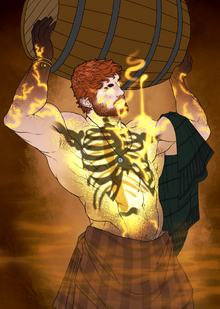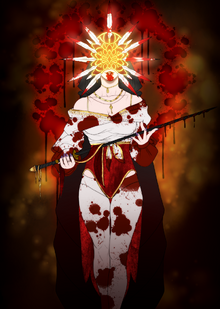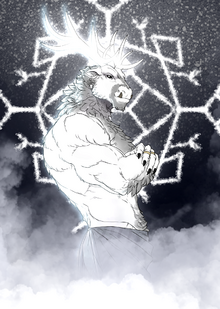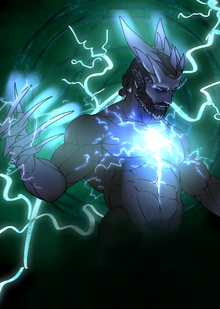Fornoss is one of the earliest Religions of the Ailor Race, that survived thousands of years of conversion by other Religions as well as attempts to be eradicated by various nations, as one of the few surviving so called Pagan Faiths. Unlike the other (mostly) dead Pagan Faiths, Fornoss has a large following, particularly among Velheim and Gallovian Ailor, though a large number of Urlan, Dwarves, and some Ashhaven Eronidas also follow it, meaning it is not limited in scope to just Ailor. Fornoss is sometimes also called the Old Gods Religion, but this is not a historically correct term. The Gods are not old from a pure chronological perspective, and it is certainly not the oldest Religion in Aloria. This term was mostly popularized by the Ailor, who when reviewing only their own history, can see Fornoss as the oldest Religion, but when taking the totality of the world's history, Fornoss is a more accurate term, which roughly translates to "Ancient us", an homage to its survival through the ages.
Origins
The birthing of the Gods and the founding of the Religion are two distinct periods. The birthing of the Gods is a mysterious period perhaps thousands of years before the first followers professed their belief in the Gods, as it is said that the Gods wandered for many ages before finding the people that would recognize their worth. It is said that the Eili Gods were born at the foot of the tree Arne surrounded by Dragons, though it is unclear if these refer to the Draconism Dragon Gods, or just the folktale version of Dragons which may also have been Skywyrms. There is also some theological debate about whether Arne is actually the Draconist Goddess Daiana, because no Tree of Life has ever been found elsewhere, but most Fornoss believers hold onto the version that states Arne is not a Dragon. The Fornoss Religion is roughly 15,000 years old, though this has an error margin of about 3,000 years, because the proto-Velheim people who were the first Fornoss followers did not have a form of writing at the time. The Religion was founded on a series of islands and part of the mainland of Oldt Tera (Ceardia), where the locals embraced a form of polytheism while most other Ceardian tribes were monotheistic. The Eili offered the faithful escape from the endless bloodshed and misery and slavery under the Elves that terrorized the Oldt Tera shores, fleeing the mainland, and retreating to some island called Aldra, which cannot be found on any modern map. On Aldra however, the Fornoss believers still were not safe, so the Eili contacted the Vola, and created The Pact, which joined both Pantheons to the Fornoss believers as two distinct unions, and the Fornoss people were finally given safety in Volaheim's embrace through the Vaarda Gates. For thousands of years, the Fornoss followers spread across the world through the Vaarda Gates, until Svartskra.
Core Beliefs
The Fornoss Gods are divided between two distinct Pantheons, the Eili who are generally considered mindful and virtuous but restrained, and the Vola who are generally considered opportunistic and selfish but powerful. The two Pantheons represent the two halves of any person's soul, filled with desire to do good by others, and desire to do good by one's self. It is important to stress here that there is no ontological morality that can be assigned to either Pantheon. While some Eili create the impression of being purely benign, they are in ways just as flawed as mortals and have desires and wants and needs that can cause them to commit great misdeeds, such as the time when Bard cut off Svol's arms because Svol refused to participate in Bard's punishment of the faithful for small misdeeds. Similarly, Hrymrøk foments chaos and anarchy wherever and whoever she touches, however even when cities crumble and burn, does the destruction give way to the liberation of the enslaved Fornoss followers that lived in the undercities. While generally speaking all Gods have good intentions for their followers, they are all equally capable of cruelty, misguidedness, deceitful or selfish actions to preserve their worship, which speaks to their vanity. However, because Soldi inherently represents helping others, and Svaldi represents using others, the faithful still draw lines in the sand and dictate morality on each other based on their personal beliefs, even if there is no theological reason to reinforce it. There are some people who worship only the Eili called Eilirik, and some people who only worship the Voli called Volirik, while a person who worships both is called a Hvarkirik. These three groups tend to conflict with one another for religious reasons, but usually unite when facing an external threat, like they did during the Skagger Wars against Regalians. Fornoss does not have a strict list of Virtues and Vices, rather, source the list of Soldi and Svaldi enriching activities from the Gods and Goddesses section.
Soldi & Svaldi
Soldi and Svaldi are two very important terms that accompany the Fornoss believers throughout all their lives. In the simplest of terms, Soldi is honor derived from virtue, while Svaldi is honor derived from opportunism. Soldi and Svaldi can be seen as resources that souls accrue in life as they grow older, and the goal of any Fornoss believer generally is to acquire high Soldi or Svaldi and be permitted into the afterlives of the Eili and Vola. Some might even consider trying to acquire both, a difficult balancing act, but if successful, might result in the very Gods themselves playing games of skill and wit to secure the soul for their own afterlives. This can sometimes result in a so-called Hvitdraugr, who is Undead Draugr until such a time comes that the Gods have finished their conflict over the person's soul (if they stay alive for that long in an Undead unfriendly world). Finally, it is also possible to lose Soldi or Svaldi from actions that go against the tenets of the Gods. It is in fact possible to lose all Soldi or Svaldi all at once, but this is usually not a complete disaster. Either honor can be restored, and can in fact be restored by another person. It is not uncommon for a father to lose all Soldi, resulting in their son beginning a quest to restore Soldi in his name. When offering his achievements up to the Gods, he offers them in his father's name, resulting in the Gods restoring the Soldi of his father. It is even possible to do this for people who have already died and passed into Imellomgård (purgatory), or who have come back from Imellomgård as Draugr Undead. In such a case, the living must restore their Soldi or Svaldi, after which they are released and restored to the proper afterlife, and in rare cases, to life either as a living person or a Revenant Spirit.
Eiliheim & Volaheim
Unlike all other Religions, Old Gods has two afterlives, the Eiliheim which is the paradise of the Eili Pantheon, and the Volaheim which is the paradise of the Vola Pantheon. There exists also a realm in between, but this is not really classified as a paradise and more like a purgatory called Imellomgård, which literally translates to the land in between. While Eiliheim and Volaheim are described as places filled with the luxuries of life and pleasures of mortal life made immortal, Imellomgård is a land devoid of color, song, happiness and purpose, where souls who are refused entry into the other afterlives are forced to wander for all eternity. To enter Eiliheim, a person must have high Soldi, and to enter Volaheim, a person must have high Svaldi. If a person has neither in adequate quantity, or offended both Pantheons by having negative Soldi or Svaldi, they are condemned to Imellomgård to wander the mirror-wastes for all eternity. Though, Undead sometimes come back from Imellomgård in the form of Draugr Undead, if their bodies were not properly interred in the Helbolwen burial sites.
Svartskra
The Svartskra identifies a pivotal point in Fornoss history that despite its massive importance to all Fornoss believers, is mostly shrouded in mystery either by the Eili forcing the faithful to forget, or the people willingly abandoning any reference to this period to avoid the stray faithful from looking too deep into the matter and opening old wounds. As part of the Fornoss origins, the so-called Vaarda Gates, exist all over the world visited by Fornoss followers, helping their early colonizing boom. It is said by the Eili that these Gates were built by Bev, and passed through Volaheim to fold time and space together, allowing instant transportation across vast distances. At some point, the relationship between the Fornoss believers and the Eili, as opposed to the Vola and their Spirits, turned sour. It is said by the Eili that Rand (who they call the Great Betrayer) tricked them and condemned the Fornoss followers to some kind of horrible fate, thus causing their rebellion against the Pact that was meant to save the early Velheim people from Elven enslavement. From this point it is unclear if the Fornoss believers were expelled or fled from the Volaheim Gates. Whatever the circumstances, the Gates were closed shut after everyone was out with Bev's Keys (Artifact Weapons), which were then scattered across the world. The Vola maintain that the Eili fomented a false rebellion and that the followers defaced the Vola in their own home, though whichever version is closer to the truth, is hard to say as both sides have motive to lie. The last side effect of Svartskra (the day the Gates shut), was that the two Eili who had brokered the deals with the Vola the Flesh God Gro and the Metal God Jord were banished by the Eili and stripped from the Pantheon. Similarly, the Vola banished the two Gods responsible for working out the deal with the Eili being the Revenge God Asbjørn and the Greed God Frynni, who were also stripped from the Pantheon. Since this day, the Eili and Vola have been immortal enemies. As a consequence of this animosity, both sides agreed to refrain from interfering with the faithful too much, so as to prevent all out holy war within the Religion. This explains why the Fornoss Gods have been exceptionally silent during major tragedies that struck for example the Velheim people in the past 300 years, however in recent years, this policy has shown signs of cracking, with some raising concerns that if the Gods get too involved, that they will start fighting each other.
Gods and Goddesses
The Fornoss Gods are divided over two Pantheons, Eili and Vola. The God listing below shows Eili and Vola as prefix in front of their names. This is purely for ease of readability, in daily life, the believers do not prefix the names of the Gods with their Pantheon membership, this is purely for the reader. The titular name is also not necessary, it just provides a more poetic way of referring to them without using their name directly. Because both Pantheons expelled two Gods each, and because the Pantheons didn't become established all at once and some Gods joined much later, it is still possible for this Pantheon to grow. While Fornoss faithful can choose Patron Gods that they feel strong connections to, unlike other Religions, a Fornoss Follower must always worship whole Pantheons, either only Eili or Vola Pantheons, or both.
Eili Bev, Doorway of the Moon

- Name: Bev, the Lord of Water, the Dead Ferryman or the All-Seeing Mirror.
- Domain: Bev's domain is the mortuary cult, the death rites, and mortal aging.
- Symbols: Mirrors, The Mortuary Cloth, rich and deep colors of Blue and Black.
- Role: Bev measures the Soldi of the Dead, and guards the Gate to the Afterlife.
- Traits: Cryptic, Silent, Reserved, Slow-Acting, Careful, Observant, Learned.
- Temple: Bev's largest Temple is the Dead-Door Mortuary in Irvainvik, Drixagh.
- Allies: Ammuloa followers, priests of other societies, especially Unionist.
- Enemies: Anything Ordial Aligned, especially Undead, and more so Draugr Undead.
- Soldi: Gained from tending/respecting to the dead, lost from disrespecting the dead.
- Rituals: Bev rituals involve the tending of Helbolwen graves, refreshing flowers and offerings, and lighting candles by the Bev statue which can always be found in a Helbolwen. Bev is also worshiped through the singing chalice, large chalices filled with water and played somber and harrowing tunes with by gliding fingers over the rims.
|
|
Vola Rand, Herald the Dark Celestial
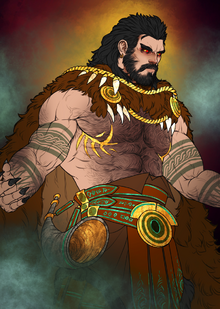
- Name: Rand, called Great Betrayer by Eilirik, or Power Arken by non-believers.
- Domain: Rand is the lord of Volaheim itself, said to never leave his realm.
- Symbols: Rand's symbol is the red Evil Eye, bear claw scars, and bears.
- Role: Rand acts like a King of the Vola, and commander of the Volaheimr.
- Traits: Power-hungry, Domineering, Authoritarian, Strong-willed, Capable.
- Temple: Rand has no temple, Volaheim itself is one big temple to his glory.
- Allies: Rand's only allies are the Void Arken, he has no need for others.
- Enemies: Rand has no explicit enemies, except for the Exist Arken, notably Justice.
- Svaldi: Gained from establishing power and control, losing from banishment.
- Rituals: The Feast of authority involving guests choosing their preferred leader among the gathered, with the winner gaining Svaldi. The Binding of Power is respected even by the Eilirik, a ritual in which two persons agree to a binding pact in blood, that if either fails or breaks, they lose all Soldi or Svaldi when vowed to their preferred Gods.
|
|
Eili Leif, Warmth of the Fire

- Name: Leif, the Lord of Fire, Warmth of the Rising Sun.
- Domain: Leif is the God of Love and Affection, and of Passion and Care.
- Symbols: Leif is represented by Fire and the blazing Golden Sun.
- Role: Leif is set to bring warmth and sunlight to the world and to hearts.
- Traits: Compassionate, Loving, Parental, Passionate, Driven, Energetic.
- Temple: Leif's largest Temple is the Sun-Sky House in Kongehjem, Nordskag.
- Allies: Theomar Followers, Regulus Followers, and kindhearted Bloodcast Knights.
- Enemies: Followers of any Moon-themed Gods, Armas/Amandaros followers.
- Soldi: Gained from loyalty to Lovers/Family and Kindness, lost from Treason.
- Rituals: Many of Leif's rituals involve offering things like fruits or hunted animal carcasses to the flame, believers saying that the flames offer them up to Leif until nothing but ash remains, absorbing the life and using it to pull the Sun through the sky each day. Other rituals involve the sharing of passion with other believers in his Temples.
|
|
Vola Thirun, Fates of the Dark Sun
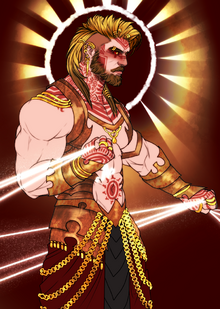
- Name: Thirun, called Pride Arken or Ott by non-Believers.
- Domain: Thirun is the God of Magic and of Pride and Vanity.
- Symbols: Thirun is represented by the Dark Sun surrounded by Light and Hounds.
- Role: Thirun is the source of all Fornoss God Magic but also the Magic Burden.
- Traits: Prideful, Vain, Sardonic, Sarcastic, Greedy, Scornful, Ego-driven.
- Temple: Thirun's largest Temple was destroyed by Regalia in the Elven War.
- Allies: Pride/Fury Arkenborn, Evolism followers, Vampire hunters.
- Enemies: Vampires, Justice Arkenborn & Followers, Publicly Weak Persons.
- Svaldi: Gained through great achievements, lost by losing Duels.
- Rituals: The Prideful Parade is one custom that involves demanding others show to a public roasting session where the aim is to praise the person who demanded they show, and roast the opponents who invited others. Another is the Prideful Feast, where each produces Food which instills pride in their cooking, and they compete over the best dish with others.
|
|
Eili Njal, Keeper of the Light

- Name: This far Max This far Max This far Max This far Max This far Max This far Max
- Domain: Njal's domain is that of light, and the sky, as well as all of the arts.
- Symbols: Njal is represented by clouds and bright pastel colors and light prisms.
- Role: Njal is the diplomat and artist of the gods, providing entertainment in Eiliheim.
- Traits: Artistic, Snarky, Whimsical, Creative, Sloth, Childish, Caring.
- Temple: Njal's largest temple was destroyed when Ceardia became forsaken.
- Allies: Artists, Musicians, and Creatives of any kind, and Queer people.
- Enemies: Njal's only true enemies are those who abstain from a good stiff drink.
- Soldi: Gained by creative expression and bringing joy, lost by destroying art.
- Rituals: Njal is Bard's husband, and because of this, many of his rituals involve Bard in some way. Skysteel Forging is the act of letting an artist inspire a forger to produce a work of art and tough steel at the same time. Other rituals involve poetry duels, and Annointment of the Artist, where Artists use body paint on a strong Man dressed as Bard for Art.
|
|
Vola Svol, The Punished Shadow
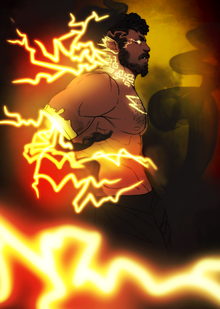
- Name: Svol, Bard's Bane, the Dark Lightning Lord.
- Domain: Svol's domain is thunderstorms, but more metaphorically of lies and deceit.
- Symbols: Shadows, Lightning, Missing or fully Tattoo'd arms, the colors black and yellow.
- Role: Svol was once a Eili, until punished by Bard, changed teams to plot for Rand.
- Traits: Analytical, Mindful, Deceitful, Witty, Suave, Charming, Good-Tempered.
- Temple: Svol's Temple is the Copper Tower now within Life Isldar land in Ellador.
- Allies: Trickster god followers and politicians, Inth & Nox followers.
- Enemies: Justice Arken(born), Guards, Knights, Justicars, Knights.
- Svaldi: Gained in subterfuge plots, or beaten Knights, lost by being deceived/losing.
- Rituals: Svol's rituals are deceptively easily hidden as party games, especially those that involve lying. A common one is Svol's Gauntlet, where everyone produces 2 truths and a lie, and gains points each time a person in the gathering cannot guess which one is the lie, or guesses wrong. Another is punishing tyrannical/corrupt law enforcement with violence.
|
|
Eili Dáuw, Bringer of Order

- Name: Dáuw, The Under-King, the Dwarf-Lord, the Last Stalwart.
- Domain: Dáuw is God-King of the Dwarves, and the Lord of all Soil and Order.
- Symbols: Dáuw is represented by the Dwarven Runes and shapes of Mountains.
- Role: Dáuw's role is to bring order to mortal society through stable structure.
- Traits: Resolute, Stalwart, Defiant, Stubborn, All-Knowing, Contemplative.
- Temple: Dáuw's largest Temple is the Great Chamber in Rammuur, Ellador.
- Allies: Craftsmen, Legislators, Juvin followers, Justiciars, Knights.
- Enemies: Anarchists, Evolism followers, Jacobins, Drakkar, Philosophers, the Military
- Soldi: Gained by protecting others, lost by letting society slip to anarchy.
- Rituals: Dáuw have changed over the years, changing from justice and order-reinforcing rituals, to rituals more centered around Dwarven culture, as a byproduct of the catastrophic population decline of the Dwarves. Any festival or event that celebrates, highlights, or discusses and educates on Dwarven Culture is a form of worship to Dáuw.
|
|
Vola Hrymrök, The Charnel Chaos
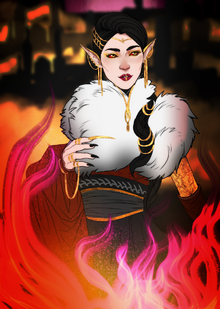
- Name: Hrymrök, Sirannal Týmal (in Elven), or the Anarchy Arken to non-believers.
- Domain: Hrymrök is the chained guilt of the Elves towards the Fornoss believers.
- Symbols: Broken chains, cracked shields, and broken statues mended with gold.
- Role: Hrymrök was imprisoned by Rand to repent for Elven slavery by freeing them.
- Traits: Wroth, Vile, Ill-Mannered, Haughty, Snobby, Loathsome, Indignant.
- Temple: Hrymrök's Temple is the Haunting Mask Cliff in Maartasil.
- Allies: Slave-Abolitionists, Allorn-Haters, Estelley Faithful (except Cemaan).
- Enemies: Cemaan followers, Unionism followers, Archon, Draconism followers.
- Svaldi: Gained by freeing Thralls & Mind-slaves, lost by being enthralled.
- Rituals: Hrymrök is a bit of an oddity even for a Vola, because she doesn't really want to be a Goddess. Still, worship to her is more a form of satisfaction appeasement, as if the faithful are responsible for keeping her happy while she does her work freeing Fornoss slaves and oppressed from Elven control by food/wealth offerings to her Magenta Flames.
|
|
Eili Halfvel, Father of Godly Blood

- Name: Halfvel, the Wolf-Father, The God-Mark Bearer, The Ice-Wolf.
- Domain: Halfvel is the lord of Demigods, the tamer of Marken & other Beasts.
- Symbols: Halfvel is represented by the Cloth of Dominion & Wolves.
- Role: Halfvel's role is to purposefully produce offspring among Mortals.
- Traits: Guiding, Remorseful, Helping, Altruistic, Melancholic, Loyal.
- Temple: Halfvel's largest Temple is the Wolf Rest in the Cains.
- Allies: (self-controlling) Marken, other Godborn, and Asha & Urlan.
- Enemies: Those who hunt Transformed Persons, The Afflicted, Undead.
- Soldi: Gained by protecting the environment, lost by killing Transformed Persons.
- Rituals: Halfvel's rituals often involve the seeking out of Halfvel's Godborn children, and aiding them in their quest for Demigod status among Fornoss followers, or correcting their path if they have been led astray. Other forms of Worship involve helping those who Transform deal with their curse, or protecting them from persecution.
|
|
Vola Eikki, Drinker of the Blood Taint
- Name: This far Max This far Max This far Max This far Max This far Max This far Max
- Domain:
- Symbols:
- Role:
- Traits:
- Temple:
- Allies:
- Enemies:
- Svaldi:
- Rituals: Two full Lines
|
|
Eili Bard, Bear-Lord of Protection
- Name: This far Max This far Max This far Max This far Max This far Max This far Max
- Domain:
- Symbols:
- Role:
- Traits:
- Temple:
- Allies:
- Enemies:
- Soldi:
- Rituals: Two full Lines
|
|
Vola Blodrúna, The Crimson Carnage
- Name: This far Max This far Max This far Max This far Max This far Max This far Max
- Domain:
- Symbols:
- Role:
- Traits:
- Temple:
- Allies:
- Enemies:
- Svaldi:
- Rituals: Two full Lines
|
|
Eili Elkonur, The Winter Hunter
- Name: This far Max This far Max This far Max This far Max This far Max This far Max
- Domain:
- Symbols:
- Role:
- Traits:
- Temple:
- Allies:
- Enemies:
- Soldi:
- Rituals: Two full Lines
|
|
Vola Odal, Fear of the Dark
- Name: This far Max This far Max This far Max This far Max This far Max This far Max
- Domain:
- Symbols:
- Role:
- Traits:
- Temple:
- Allies:
- Enemies:
- Svaldi:
- Rituals: Two full Lines
|
|
Priestly Activities
Fornoss does not have a formal priesthood associated with it, because it is a very disorganized religion. What this means, is that each valley, each fjord, each town, and each city, may have slightly altered folklore. Each priest may tell the legends and folktales of the Gods slightly differently, and some places far removed from society may even use different names altogether. The lore presented on the God listing should generally remain consistent, but players are encouraged to embellish details and fill the gaps with their own unique spin, and generally speaking even if it contradicts the views of other Characters, that is just regional variance. While there is no strict hierarchy under a Fornoss version of the Pope, Fornoss does have official religious figures with occupations within wider Fornoss believer societies.
General Priesthood
Valsung
Skaarda
Laarna
Synna
Peripheral Concepts
Peripheral Concepts are important thoughts from Fornoss theology, that didn't necessarily fit anywhere else on this page, but also aren't strictly necessary to know. They cover a wider range of topics which Fornoss believers have a solidified opinion of, or things that Fornoss faithful might get questioned on in Roleplay and may be useful to have answers for.
The Arken Question
Vaarda Gates & Keys
The Magic Burden
Other Expanded Lore
The Other Expanded Lore section just contains loose thoughts which were not applicable to any of the bullet points in the God listing, or simply did not fit anywhere else.
- Trivia





